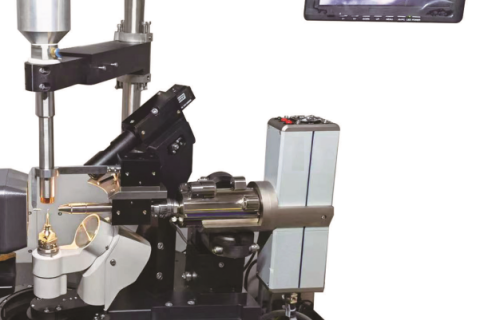
- Home
- >
News
Excellent detector, polycrystalline sample X-ray diffraction analysis, precise instrument tuning, excellent resolution
The X-ray single crystal diffractometer is mainly used to determine the three-dimensional spatial structure and electron cloud density of crystalline substances such as inorganic, organic, and metal complexes, and to analyze the structure of special materials such as twinning, non commensurate crystals, quasicrystals, etc. Determine the accurate three-dimensional space (including bond length, bond angle, configuration, conformation, and even bonding electron density) of new compound (crystalline) molecules and the actual arrangement of molecules in the lattice; It can provide information on the crystal cell parameters, space group, crystal molecular structure, intermolecular hydrogen bonding and weak interactions, as well as structural information such as molecular configuration and conformation. It is widely used in analytical research in chemical crystallography, molecular biology, pharmacology, mineralogy, and materials science.
The use of hybrid pixel detector can achieve the best data quality while ensuring low power consumption and low cooling. This detector combines the key technologies of single photon counting and hybrid pixels, and is applied in various fields such as synchrotron radiation and conventional laboratory light sources, effectively eliminating the interference of readout noise and dark current. Hybrid pixel technology can directly detect X-rays, making it easier to distinguish signals, and detector can efficiently provide high-quality data.
We not only provide products, but as a carrier, we pay more attention to the convenience, efficiency, accuracy, and satisfaction that it can bring to our customers' actual work. This is our commitment that we have always upheld. As the most advanced domestically produced X-ray diffractometer, TD-3500 has benefited organizations such as colleges, research institutions, and industrial enterprises in material identification and analysis, receiving high praise. This also confirms our commitment to customer satisfaction. Of course, with the rapid pace of the times and competition, in order to ensure higher customer expectations, we continuously update and improve our product line. Our goal is not only to lead domestically, but also to keep up with the world!
A research team from the Hefei Institute of Physical Sciences at the Chinese Academy of Sciences has recently conducted a study proposing a novel method to improve X-ray detection by incorporating out-of-phase CsPb2Br5 peritectic crystals into CsPbBr3 block materials.
X-ray detector is a device used to detect X-rays, which has a wide range of applications in medicine, science and industry. X-ray detectors convert X-rays into electrical signals for digital processing and imaging.
X-ray technology plays a vital role in medical and scientific research, and recent advances in X-ray technology are enabling brighter, stronger beams and imaging of increasingly complex systems under real-world conditions.
In recent years, X-ray small Angle scattering technique of biological macromolecules has been widely paid attention to. This article will mainly introduce the relevant progress of the combination of biological small Angle and other techniques in recent years.
Three single point detectors are shared below: proportional counter, scintillation counter, and semiconductor solid state detector.
It uses the X-ray principle to carry out qualitative or quantitative analysis and crystal structure analysis of polycrystalline materials such as powder samples and metal samples.











